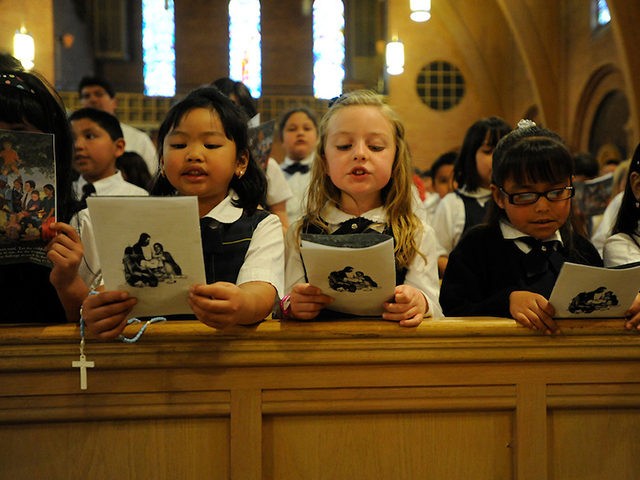Blaine amendments, borne out of 19th-century anti-Catholic bigotry, have been the constant bane of the modern education-choice movement. The amendments, currently found in the constitutions of 37 states, prohibit public funds from supporting sectarian schools.
Blaine amendments have been at the center of legal disputes in Arizona, Georgia, Nevada, and elsewhere, in which leftist groups and teachers-union hacks have challenged school choice programs that allow parents to educate their children at religious schools using public funds. Thus far, supporters of school choice have experienced several setbacks, but all that could soon change.
The U.S. Supreme Court is considering a case that could erase Blaine amendments from the school choice debate once and for all. Teachers unions, who have used Blaine amendments as their bread-and-butter argument in dozens of cases, have a legitimate fear this ruling will spell doom for their failed system.
“After lawmakers enacted [education savings accounts], teachers unions and other special interests challenged their legality in court,” The Heritage Foundation’s Lindsey Burke wrote in October 2016. “Arizona unions based their suit on the state’s Blaine amendment, which prohibits public funds from flowing to religious institutions. In 2014, Arizona courts ruled in Niehaus v. Huppenthal ESAs do not violate the state constitution.”
In Nevada, too, the state’s Supreme Court ruled against the local chapter of the ACLU, which was challenging the Nevada’s new ESA program on the grounds it violated the state constitution’s Blaine amendment. And though, as Burke writes, “both research and legal precedent … make [ESAs] well-positioned to withstand legal challenges based on Blaine amendments,” the amendments continue to serve as an impediment to families accessing school choice programs in an efficient way. In Nevada, for instance, thousands of families are stuck on a waiting list as the legislature figures out a way to fund the ESA program after the state’s Supreme Court declared the program (but not its funding mechanism) constitutional.
The very existence of Blaine amendments also seems to serve as a deterrent to attempts to establish more education choice programs, and there appears to be a positive correlation between claims of Blaine amendment violations being shot down and more states moving to propose their own forms of popular school choice programs.
“State legislators across the country are pondering education savings account measures in the wake of a split decision by the Nevada Supreme Court that upheld the constitutionality of that state’s program, while killing the funding source,” Watchdog.org reported in October 2016. “Lawmakers in Indiana, Iowa, Missouri, Montana, New Hampshire, North Carolina, Oklahoma, Texas, Virginia, West Virginia, and Wisconsin are considering their own ESA programs.
“‘Nevada’s nearly universal ESA has set the new standard for educational choice,’ Leslie Hiner, vice president of programs at EdChoice, told Watchdog.org.”
The fact that teachers unions may soon be unable to blame Blaine spells further endangerment for their beloved (and often failing or mediocre) public schools.
If SCOTUS removes Blaine amendments from the arsenal of anti-school choice advocates, what will the unions and their cohorts have left? Claims that school choice “drains public school funding” have been disproven many times over, and parents who want to send their child to a better school—one that is not decided for them based on their ZIP code—can hardly be expected to care about financing the failed school they’ve chosen to abandon.
A U.S. Supreme Court ruling finally to dismiss Blaine amendments would be a win for the whole country. We could at last do away with this bigoted measure, which has marred the constitutions of many states for decades while opening the door for the type of educational alternatives children and their families have been yearning for.
Such a ruling wouldn’t be all bad for public schools, either. More school choice would mean greater competition and motivation for government schools to strive to their greatest potential. All public schools have to worry about is whether the private sector can do things better, and again, their fears are legitimate.
Teresa Mull (tmull@heartland.org) is a research fellow in education policy at The Heartland Institute.

COMMENTS
Please let us know if you're having issues with commenting.